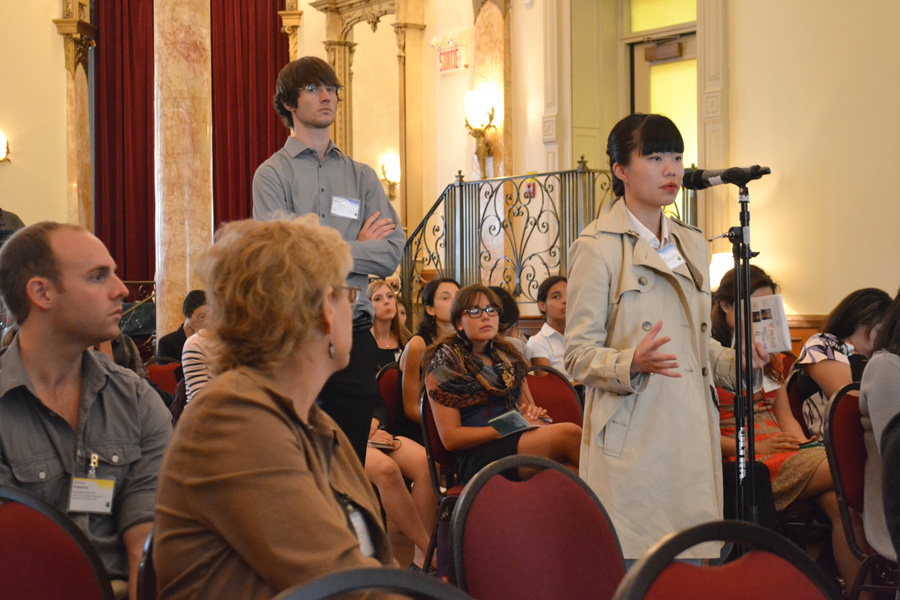On Friday, Sept. 14, a group of graduate students, professors, policy-makers, and entrepreneurs gathered in the McGill Faculty Club ballroom to attend the third annual Science and Policy Exchange.
The conference featured panel speakers from government, industry, and academia. The sessions covered three topics: sustainable policymaking, the 2014 health care reform, and science literacy in Quebec.
According to Janet Prince, director of the Science and Policy Exchange organization and PhD candidate in neurology and neurosurgery at McGill, the mission of the conference was “to give students an opportunity to discuss [science and policy issues] with decision-makers in Quebec and at a federal level.”
“You can have people at a government and industry level that never hear the voice of students, and vice versa,” she said.
Vasanth Ramamurthy, a PhD student in his final year in experimental medicine at McGill, attended the conference hoping to learn how his research could be used on a larger scale, and how businesses and policy-makers look at the work being done by PhD students.
“Events like these are a great way for students to learn how they can apply their talents to the bigger picture,” Ramamurthy said.
The Science Policy Exchange is an annual event. The organization is run by a team of volunteers, graduate, and postdoctoral students from McGill University, Université de Montréal, and Polytechnique Montréal. The board of directors has members from both McGill and Concordia.

Sustainable Policy-Making
Accoring to a recent report by the World Economic Forum, Canada placed 14th out of 17 developed countries in innovation.
Federally-appointed panelists at the Science and Policy Exchange focused on the disconnect between sustainable technology breakthroughs and commercially available products, as well as their impact on Canadian innovation.
“Despite strong research, breakthroughs are not leading to commercialization and investment because Canada lacks an innovation policy,” CEO of Polytechnics Canada and member of the Jenkins panel Nobina Robinson said. The Jenkins panel was charged with leading a review of federal support to research and development.
In 2011, the Jenkins panel published a report, calling for changes in tax policy and trade, in addition to stronger government focus on developing the research it funds into commercial products.
According to Laurin Liu, NDP member of parliament and McGill aluminus, the problem stems from a lack of support for research-oriented companies.
“Cutting science funding is a debt we are leaving for future generations,” she said of federal programs like Canada’s Major Resources Support.
Health Care Reform
Despite a common assumption that Quebec’s aging population is the largest financial burden on the health care system, panelists agreed that other factors, such as improper management, costly novel technologies, and the privatization of certain aspects of health care account for the burgeoning costs.
The health care reform, slated for 2014, will be based on 18 reports generated over the last 15 years, outlining problems facing the system. Louis Theriault, director of health economics at the Conference Board of Canada, says half of the 432 recommendations in these reports called for improved health care system management.
Theriault believes students will play an important role in ensuring adequate implementation of these policy changes in the future.
“Students are the future policy makers, future politicians and future business leaders—this is the demographic group that should be most concerned about the future,” he said.
Science Literacy
In general, students are showing less interest in science, according to Johanne Patry, an expert in education and chair of Science on Stage Canada. She partly attributes this lack of interest to a failure by teachers to impart a passion for science to students.
“Rather than reaching [out to] students, we should reach teachers, since that reaches a thousand students,” Patry said.
Quebec’s first Chief Scientist Remi Quirion, was the panel’s keynote speaker. Quirion chairs the board of directors for the three Fonds de Recherche du Quebec (FRQ), which work to ensure that Quebec retains its best researchers and students.
Quirion said that Quebec is working to create an environment to attract the best students with challenging programs and by making sure that the research is well-funded.
According to Quirion, schools in Quebec can “give the best minds an edge—in Quebec, given our culture, bilingualism, or maybe speaking three languages, can give you an edge.”








